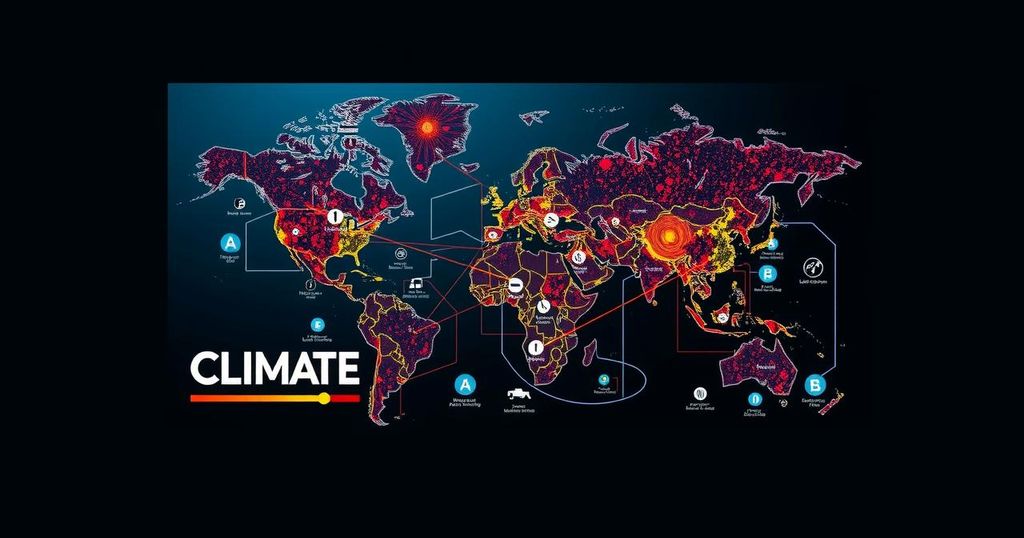Navigating COP29: Climate Dialogue Amidst International Crisis

COP29, occurring amid global crises, faces significant hurdles to secure meaningful climate agreements. Azerbaijan’s experience in climate diplomacy, coupled with geopolitical tensions and economic concerns, complicates negotiations. Central to discussions will be financial commitments to support developing nations, despite skepticism about outcomes in light of Trump’s election and strained international relations.
The 29th United Nations Climate Change Conference (COP29) is set against a backdrop of global turmoil, including ongoing conflicts in Ukraine and the Middle East, and economic uncertainties following the return of Donald Trump as U.S. President. Scheduled from November 11 to November 22 in Baku, Azerbaijan, this conference will involve over a hundred nations attempting to reach an agreement on climate action, although the prospect seems grim due to Azerbaijan’s oil-dependent economy and authoritative political climate. Amid mounting pressures, calls for boycotts persist, spurred by Azerbaijan’s military actions in Nagorno-Karabakh, which displaced thousands. Unlike the UAE, which fostered a cooperative atmosphere during COP28, Azerbaijan lacks experience in climate diplomacy, and pre-conference negotiations have lagged. Furthermore, the geopolitical landscape, exacerbated by Trump’s election, poses additional hurdles for constructive dialogue. Central to the discussions will be commitments regarding North-South financial support, particularly the pledge from developed nations to provide $100 billion yearly to assist developing countries in combating climate change. This goal was delayed but aims to be surpassed in future frameworks due to increasing funding needs. The urgency of the conference is also compounded by the requirement for nations to update their climate commitments by 2025, as stipulated by the Paris Agreement. Despite these challenges, the COP conferences uniquely enable diplomatic engagement unimpeded by external crises. The traditional divide between developed and developing nations continues, yet the need for cooperation remains critical. This iteration of COP fosters dialogue between superpowers such as the U.S. and China, whose collaboration was pivotal in securing the Paris Agreement in 2015. Nonetheless, ongoing domestic issues, notably political instability, may influence nations’ readiness to fulfill their commitments. European countries, facing public dissatisfaction and budget constraints, may resist proposals from developing nations. As global weather patterns become increasingly erratic, the pressure mounts on vulnerable countries to secure prior commitments towards climate finance. The implications of Trump’s electoral victory remain uncertain, with concerns that it may hinder U.S. participation in funding obligations. The bond between the European Union and China will be critical in leading the negotiations, although existing trade disputes have strained their relationship. Overall, the outcomes of COP29 appear ambiguous, drawing upon the mixed results of preceding COPs. The series of climate summits has raised public scrutiny concerning their effectiveness. Although these conferences play a significant role in climate diplomacy, it is vital to temper expectations and recognize that they are platforms for collaboration rather than immediate solutions. As per UN analyses, current policies may allow for a 3% rise in greenhouse gas emissions by 2030 when a reduction of between 30% to 45% is required to meet carbon neutrality goals by mid-century.
Climate change represents one of the most pressing challenges facing the global community today, and international cooperation is essential to address its multifaceted impacts. The United Nations Climate Change Conferences (COPs) serve as critical forums for negotiating agreements among member states. COP29, which will take place in Baku, Azerbaijan, signifies a continuation of this global dialogue amidst heightened geopolitical tensions and economic uncertainties that may inhibit effective negotiations on climate action.
The landscape surrounding COP29 is rife with challenges, notably geopolitical tensions and economic instability, which complicate the pursuit of ambitious climate agreements. Despite calls for boycotts and significant delays in pre-negotiations, the urgency of financial commitments from developed countries remains paramount. The conference’s effective execution amidst these pressures will rely heavily on the diplomatic engagement of world powers, particularly as they navigate a deeply divided global environment.
Original Source: international.la-croix.com








